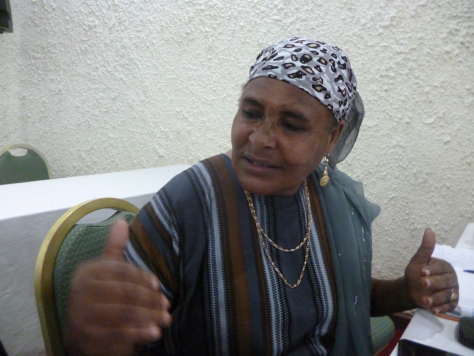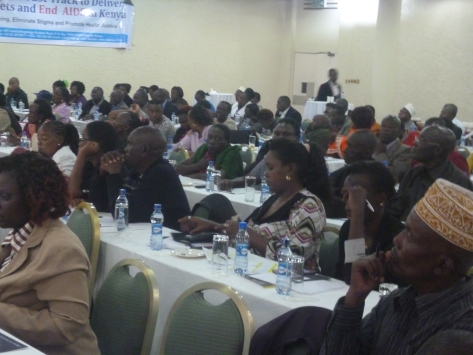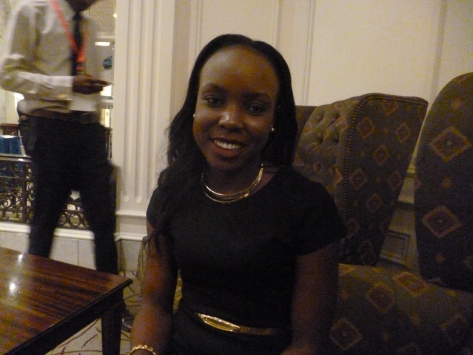|
Getting your Trinity Audio player ready...
|
By Mary Mwendwa
 “Tuliambiwa sisi ni maiti, hii ilituvunja moyo sana (we were termed as dead people, this really broke our hearts)” .These were the words that Kabale’s group of people living with HIV /AIDS in Marsabit were told by a county official over a road safety proposal aimed at teaching people dangers of HIV /AIDS. “I have never heard such kind of words in my life, what we were told broke our hearts as a group of people living with HIV, were humiliated over this proposal and some other group given the tender because of corruption .
“Tuliambiwa sisi ni maiti, hii ilituvunja moyo sana (we were termed as dead people, this really broke our hearts)” .These were the words that Kabale’s group of people living with HIV /AIDS in Marsabit were told by a county official over a road safety proposal aimed at teaching people dangers of HIV /AIDS. “I have never heard such kind of words in my life, what we were told broke our hearts as a group of people living with HIV, were humiliated over this proposal and some other group given the tender because of corruption .Wedelivered the proposal and one day we went to inquired about the process when we met the wrath of one of the Members of County Assembly(MCA).He influenced another group to get the money which was 11.5 million ksh.We went to the office to protest and no one heard our cry instead we were told “why would we give money to people who are dead”.This statement killed us emotionally, all members were torn and from that moment we realized discrimination was evident at even the highest offices like county offices.We engaged a lawyer although the road construction of Marsabit, though the road is almost complete.We don’t know if we will win, God knows our fate.”Kabale sighs.“We were called as Dhuradhema Group by District Officer , Marsabit central to do a proposal around road safety to qualify for funding as people living with HIV.The idea sounded great and without hesitation we did a proposal and submitted to the County office of Marsabit.Little did we know that we were headed for the highest form of discrimination and stigma for our group members.
Kabale Tache, who is a chairperson of a non-government organization that fights against HIV infections in Marsabit County says that fighting HIV /AIDS in the pastoralist community is very challenging.”We have so many forms of stigma among our members from Dhuradhema – a group that was formed in 2006.we have 206 members with 124 orphans that we support in the group. Our situation is wanting because we used to get money from National Government but when devolution came in we get nothing. The burden of orphans living with HIV is so huge that even some children are getting on the streets. We try our best but we are constrained by funding.”The boy children infected by HIV are so many, they suffer in silence and no one comes to their rescue. The ones who don’t come out in open suffer in the villages in silence .”
Kabale also says that the girl child infected with HIV , when they get to adolescent they get very beautiful and they are using antiretroviral drugs and therefore they get in relationships, some get pregnant and it becomes a problem , some get displaced and the situation becomes worse.”She sadly says.
Another challenge is on the cash transfers for the elderly, orphans .People living with HIV /AIDS in Marsabit don’t access any of these money transfers .”We wonder who are these vulnerable people who are supported by the government , yet people living with HIV are still vulnerable.”

Stigma associated with HIV /AIDS is not only witnessed by Kabale’s group but at least anybody living with HIV in Kenya has sad story to tell on issues related to stigma and discrimination.Sadly, we are in a society that is full of awareness and information around HIV/AIDS but stigma is still a giant that needs to be fought .This came out clearly during a recent annual consultative meeting on strengthening Meaningful Involvement of People Living with HIV (MIPA) at a Nairobi Hotel. The meeting which drew representatives from various Non –government organizations that are working with communities in fight against HIV /AIDS including National Aids Control Council (NACC), NEPHAK , NASCOP , SAUTI SKIKA among others.
Chris Ouma, was denied a teaching job in Eritrea because of his HIV status .”I was the best candidate for that job but sadly when I was told to run a medical test I openly told the panel about my HIV status and told them there was no need of testing as I was already living with HIV. My biggest shock was when I was told despite my best credentials I was not going to get the job because of my status. I was emotionally drained, I cried but that was the bitter truth that I had to swallow that particular moment.”
Mary Makokha , from REEP , a non –government organization that champions for the fight against HIV /AIDS in Busia County encountered a physical beating by a faith leader when she went to distribute condoms at a church setting.”I was slapped by a priest and told , let the people die but don’t bring condoms here. Living and fighting against HIV comes with its own challenges, but I am determined to make a difference in lives, I fight for children’s rights, widows and general human rights abuse within Busia, I have seen fruits and I will not stop, that where y passion lies.”She firmly says.
Kenya Aids Indicator Survey 2015 reveals Kenya has an average hiv prevalence rate of 6% and with about 1.6 million people living with HIV infection, it is one of the six HIV ‘high burden’ countries in Africa. The western part of the country through Homabay, Siaya and Kisumu are the most affected with HIV with rates of 25.7%, 23.7% and 19.3% respectively. The counties with the least infection rates are Wajir, Tana River and Marsabit with rates of 0.2%, 1% and 1.2%.
According to Barbara Akinyi, Legal Officer, HIV /AIDS Tribunal they have handled over 200 cases around stigma and discrimination since the tribunal started operating in 2012.”So far we have heard over 70 cases which have been successful and we have 50 cases on going.”
So what kind of cases does HIV tribunal handle around stigma and discrimination?
Barbara reveals ;”Discrimination at work places, churches and Health insurance companies that have discriminative policies are majorly what we deal with. Interestingly cases from faith based institutions especially churches are increasingly being reported. Mostly church workers come to us after they face discrimination after their HIV status are known to their leadership. This is a shocking trend because the church symbolizes solace yet religious leaders frequently reinforce stigma and discrimination of people living with HIV.

Barbara Akinyi, Legal Officer .HIV/AIDS tribunal
How does one launch a case at the HIV tribunal?
-Do a simple letter to the tribunal about the type of discrimination done against you.
-The letter is taken before the board
-Once admitted the case begins with normal court process.
Cases taken to the tribunal are free of charge and they may take upto three months .The tribunal protects the victims confidentiality while some are allowed to use Initials or names that are not real .Some of the challenges faced at the tribunal are visibility , exclusive jurisdiction where the act allows them to deal with bill of rights but only high court is allowed to do so and lack of enough resources to carry out their activies.













